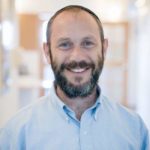On Constructing a New Sacred Space
By Rabbi Dr. Levi Cooper

The head of the Talmudic academy in the Land of Israel, Rabbi Yohanan, was astounded to learn that there were elderly people living outside Israel. Rabbi Yohanan’s amazement was born of his reading of the biblical verse that forms part of the daily Shema prayer:
.למען ירבו ימיכם וימי בניכם על האדמה אשר נשבע ה’ לאבתיכם לתת להם כימי השמים על הארץ
In order that your days be multiplied and the days of your children in the land that God swore to your ancestors to give them (Deuteronomy 11:21).
Focusing on the words “in the land,” Rabbi Yohanan understood that the only location that held the prospect of growing old with grandchildren was the Holy Land. Outside this unique space, the Divine blessing of longevity was not even a possibility, hence Rabbi Yohanan’s astonishment at the Babylonian elderly.
Rabbi Yohanan was mollified only when he was told that the elderly of Babylonia were people who would rise early to attend morning services and stay late to participate in the evening service, thus spending extended time in the synagogue. “That is the merit which is responsible for their longevity,” he declared (Bavli Berakhot 8a).
A question arises from this Talmudic exchange. What is the connection between longevity and lingering in the synagogue?
According to one commentator, staying longer in the synagogue or in the beit midrash is rewarded measure-for-measure by having life prolonged. The time invested in prayer and Torah study is repaid with a life extension (Rabbi Yehonatan HaKohen of Lunel). This approach teaches that despite the scriptural promise of longevity conditioned on living in the Land of Israel, there may be other deeds that warrant this gift. Indeed, the Bible and the sages detail a number of acts that merit long life.
An alternative approach recalls a fascinating Talmudic image. Our sages teach that in the future, the synagogues and houses of study that are located in the Diaspora will be uprooted and replanted in the Land of Israel (Bavli Megilla 29a). In light of this future relocation, these institutions carry a certain Holy Land quality, even while they are still located all over the world. In a sense, time spent in the synagogue and the beit midrash is time spent in the Land of Israel. Hence the blessing of longevity particular to those dwelling in the Land of Israel, extends to those who habituate the synagogue or beit midrash (Maharsha).
The idea that someone can be standing in one place physically, and yet be considered to be in another locale, is recognized in international law. Countries have extra-territorial jurisdiction over their embassies abroad, even though strictly speaking, the embassy compound is on the land of the host country. Similarly, a vessel or aircraft bearing the flag of a particular country is bound by that country’s laws, even when it leaves the territorial waters or airspace of that country.
Despite the parallel between international law and the image our sages conjure up, there remains a salient difference. International law creates a legal fiction that is limited to questions of jurisdiction. In contrast, our sages teach that despite physical location, a particular space may have an added spiritual dimension that transcends its physical confines.
As we break ground on a new physical beit midrash for Pardes with the vision of constructing an inviting sacred space in Jerusalem, we are proud that our students will continue to go forth from Zion to communities around the world. We are confident that wherever our students go, they will contribute to creating and sustaining learning communities. These Torah circles will be extensions of the holiness of the Pardes beit midrash in Israel. Our historic groundbreaking in the Holy Land promises to facilitate traces of holiness that will be carried forth by all who will to join us for the unique experience of studying within Pardes’s new walls.
This piece originally appeared in the program booklet for the Groundbreaking Ceremony on June 24, 2018.
Adapted from (Relics for the Present: Contemporary Reflections on the Talmud) by Levi Cooper, Published by Maggid and Pardes
Rabbi Dr. Levi Cooper teaches Bible, Hasidut, Maimonides and Midrash at Pardes.
